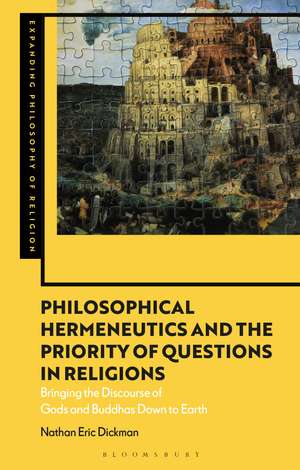Philosophical Hermeneutics and the Priority of Questions in Religions: Bringing the Discourse of Gods and Buddhas Down to Earth: Expanding Philosophy of Religion
Autor Nathan Eric Dickmanen Limba Engleză Paperback – 23 mar 2022
| Toate formatele și edițiile | Preț | Express |
|---|---|---|
| Paperback (1) | 151.57 lei 3-5 săpt. | |
| Bloomsbury Publishing – 23 mar 2022 | 151.57 lei 3-5 săpt. | |
| Hardback (1) | 435.55 lei 6-8 săpt. | |
| Bloomsbury Publishing – 23 mar 2022 | 435.55 lei 6-8 săpt. |
Preț: 151.57 lei
Preț vechi: 165.38 lei
-8% Nou
Puncte Express: 227
Preț estimativ în valută:
29.01€ • 30.11$ • 24.19£
29.01€ • 30.11$ • 24.19£
Carte disponibilă
Livrare economică 03-17 martie
Preluare comenzi: 021 569.72.76
Specificații
ISBN-13: 9781350202146
ISBN-10: 1350202142
Pagini: 224
Dimensiuni: 138 x 216 mm
Greutate: 0.26 kg
Editura: Bloomsbury Publishing
Colecția Bloomsbury Academic
Seria Expanding Philosophy of Religion
Locul publicării:London, United Kingdom
ISBN-10: 1350202142
Pagini: 224
Dimensiuni: 138 x 216 mm
Greutate: 0.26 kg
Editura: Bloomsbury Publishing
Colecția Bloomsbury Academic
Seria Expanding Philosophy of Religion
Locul publicării:London, United Kingdom
Caracteristici
Considers what is at stake when reading philosophical questions in religious texts, drawing on methods from confessionally-oriented hermeneutics and skills from critical thinking
Notă biografică
Nathan Eric Dickman (PhD, The University of Iowa) is Associate Professor of Philosophy at the University of the Ozarks, USA. He researches in hermeneutic phenomenology, philosophy of language, and comparative questions in philosophies of religions, with particular concerns about global social justice issues in ethics and religions. He has taught a breadth of courses, from Critical Thinking to Zen, and Existentialism to Greek & Arabic philosophy. Using Questions to Think (Bloomsbury, 2021) examines the roles questions play in critical thinking and reasoning, and Philosophical Hermeneutics and the Priority of Questions in Religions (Bloomsbury, 2022) examines the roles questions play in religious discourse.
Cuprins
PrefaceIntroduction: Questions in Divine DiscoursePart I: Elements of a Hermeneutic for Interpreting Divine Questions1. Questioning has Hermeneutic Priority2. Religious Narrative is Literature3. What Is at Risk with Questions in Religious Texts?Part II: Questions in the Direct Discourse of Divine Beings on the Level of Story4. YHWH asks, "Where Are You?"5. Ancestor Ma asks, "Why Are You Seeking Outside?"6. Jesus asks, "Who Do You Say I Am?"Part III: Questions Posed by Texts to Readers on the Level of Discourse7. A Biblical Author asks, "Where Do You Stand?"8. Dharma Heirs ask, "Why Do You Seek Outside?"9. An Evangelist asks, "What Do You Have to Say for Yourself?"Conclusion: Human Response to Divine QuestionsBibliography Index
Recenzii
In this volume, Nathan Eric Dickman rightly and adroitly draws attention to the place that questioning holds in three major forms of religious discourse. Dickman's careful consideration of the implications of the central role that skillful questioning plays in these traditions' processes of meaning-creation is impressive.
This book promises to shift profoundly our understanding of the role of questions in religion. While it is common today to conceive of religion as a source of answers to questions, Dickman masterfully demonstrates how this overlooks a pattern in sacred writings where deistic figures pose rather than resolve questions.
Dickman invites the reader into the opportunity and responsibility of dialogue. The distinction between deficit-driven and surplus-driven questions is innovative and striking in its ability to shake up how we engage "deific voices" and apply them to interpreting our reality. This work is an outstanding blend of challenging and accessible.
This book promises to shift profoundly our understanding of the role of questions in religion. While it is common today to conceive of religion as a source of answers to questions, Dickman masterfully demonstrates how this overlooks a pattern in sacred writings where deistic figures pose rather than resolve questions.
Dickman invites the reader into the opportunity and responsibility of dialogue. The distinction between deficit-driven and surplus-driven questions is innovative and striking in its ability to shake up how we engage "deific voices" and apply them to interpreting our reality. This work is an outstanding blend of challenging and accessible.












